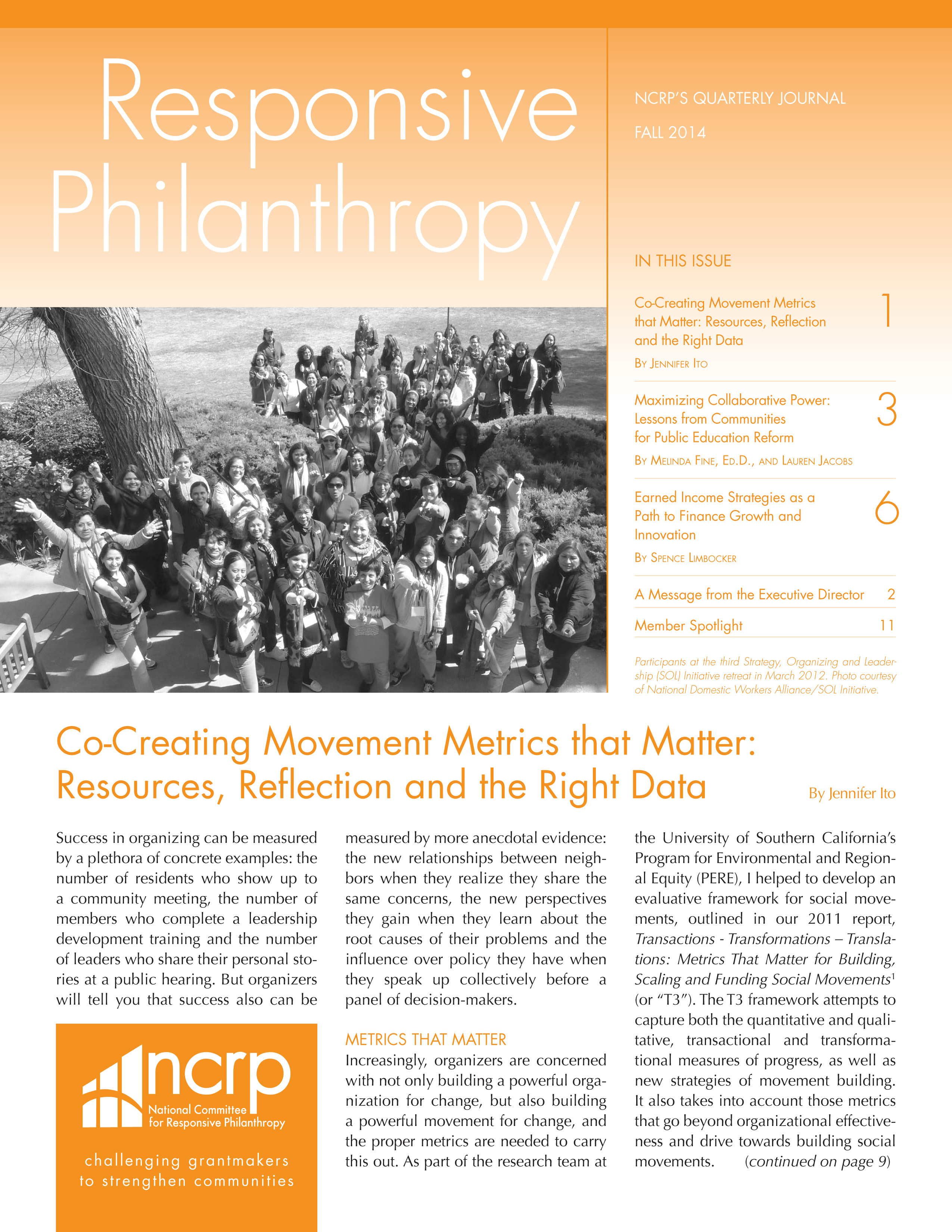 Washington, D.C. (11/12/2014) –The National Committee for Responsive Philanthropy (NCRP) today released its fall issue of “Responsive Philanthropy,” featuring pieces by top voices in the philanthropic sector. The release comes on the heels of an election cycle that demonstrated just how important it is for philanthropy to invest in grassroots organizing and advocacy to address society’s most pressing problems.
Washington, D.C. (11/12/2014) –The National Committee for Responsive Philanthropy (NCRP) today released its fall issue of “Responsive Philanthropy,” featuring pieces by top voices in the philanthropic sector. The release comes on the heels of an election cycle that demonstrated just how important it is for philanthropy to invest in grassroots organizing and advocacy to address society’s most pressing problems.
This issue of “Responsive Philanthropy” highlights effective strategies for grantmakers looking to improve the lives of the underserved and marginalized by supporting grassroots organizing and advocacy. The authors draw from years of experience in social justice research and organizing to provide applicable lessons for readers, touching on topics from creating metrics that capture both qualitative and quantitative data to diversifying income streams.
Co-Creating Movement Metrics that Matter: Resources, Reflection and the Right Data
In the cover story, Jennifer Ito, project manager at the University of Southern California’s Program for Environmental and Regional Equity (PERE), describes the program’s lessons from developing metrics for social movements and also implementing them. Ito describes how PERE tailored its “T3” framework – which incorporates transactional, transformational and translatable metrics – to the National Domestic Workers Alliance’s Strategy – Organizing – Leadership Initiative, with encouraging results.
Maximizing Collaborative Power: Lessons from Communities for Public Education Reform
NEO Philanthropy’s Melinda Fine, Ed.D., and Lauren Jacobs share ten lessons learned from the eight years that Communities for Public Education Reform’s spent building broad collaborations across sectors to advance policy reform. These lessons are tailored for foundations and grantmakers looking to build and sustain relationships among a wide network of grantees.
Earned Income Strategies as a Path to Finance Growth and Innovation
Long-time community organizer Spence Limbocker relates what he’s learned after years of studying the launch of UrbanMatters, a for-profit housing development company that is partly owned by Washington Interfaith Network, a broad-based grassroots organization working to address community issues and hold elected and corporate officials accountable. Limbocker distills this knowledge into six actionable steps that grantmakers can take to support similar earned income strategies for other community organizing groups.
This edition’s Member Spotlight showcases TASH, a Washington, D.C.-based advocacy group that has been fighting for true equity and inclusion for people with disabilities since 1975. TASH’s work underscores the need for foundations break away from the tendency to view specific issues of interest in isolation of other issues.
These articles, along with articles from previous issues, are available for free on the “Responsive Philanthropy Article Archive.” Hard-copy subscriptions to “Responsive Philanthropy” are complimentary for NCRP members and cost $25 for non-members.
###
To request a media copy, please contact Alison Howard at ahoward[at]ncrp.org or call (202) 387-9177 x33.














































































































































































































































































































































































































Leave a Reply